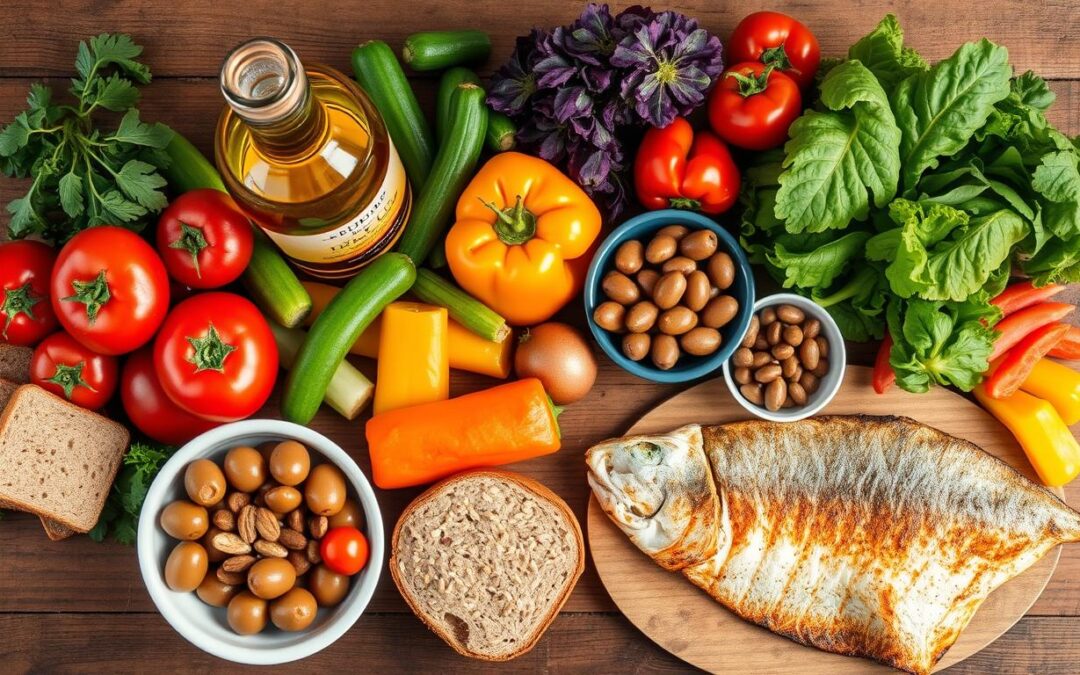Struggling to find a diet that’s both delicious and healthy? You’re not alone. Many of us bounce between restrictive eating plans that leave us hungry, unsatisfied, and ultimately right back where we started. The Mediterranean diet offers a refreshing alternative—a lifestyle approach to eating that’s been consistently ranked as one of the healthiest diets in the world. This beginner-friendly guide will walk you through everything you need to know to get started with a Mediterranean diet meal plan that’s both satisfying and sustainable.
What is the Mediterranean Diet?
The Mediterranean diet emphasizes fresh produce, whole grains, healthy fats, and lean proteins
The Mediterranean diet isn’t a structured “diet” in the traditional sense, but rather a way of eating based on the traditional foods of countries bordering the Mediterranean Sea, including Greece, Italy, and Spain. Unlike many popular diets that restrict entire food groups, the Mediterranean approach celebrates a wide variety of delicious, nutrient-dense foods.
Core Principles of the Mediterranean Diet
At its heart, the Mediterranean diet focuses on:
What makes this eating pattern unique is its emphasis on whole, minimally processed foods and heart-healthy fats. Rather than counting calories or macronutrients, the Mediterranean diet encourages mindful eating and enjoying meals with others—a refreshing approach that makes it sustainable for the long term.
Foods to Enjoy Regularly
Plant-Based Foods
Proteins and Fats
Foods to Limit
While no foods are strictly forbidden, the Mediterranean diet recommends limiting:
Science-Backed Health Benefits of the Mediterranean Diet

The Mediterranean diet isn’t just delicious—it’s backed by decades of scientific research showing impressive health benefits. Here’s what the science tells us about this eating pattern:
Heart Health Protection
One of the most well-established benefits of the Mediterranean diet is its positive impact on heart health. A landmark study published in the New England Journal of Medicine found that following a Mediterranean diet supplemented with extra-virgin olive oil or nuts reduced the risk of cardiovascular events by approximately 30% among high-risk individuals.
According to research from Harvard T.H. Chan School of Public Health, the diet’s combination of anti-inflammatory foods and healthy fats helps reduce cholesterol levels, lower blood pressure, and prevent the buildup of plaque in the arteries—all key factors in heart disease prevention.
Weight Management
Despite being relatively high in fat (primarily from olive oil, nuts, and fish), the Mediterranean diet has been shown to be effective for weight management. A 2018 study published in the journal Nutrients found that the diet’s high fiber content, emphasis on whole foods, and satiating healthy fats help control appetite and promote sustainable weight loss.
Researchers at the University of Barcelona found that participants following a Mediterranean diet lost more weight and maintained their weight loss better than those on a low-fat diet—without feeling deprived or hungry.
Reduced Risk of Type 2 Diabetes
The Mediterranean diet may help prevent and manage type 2 diabetes. A meta-analysis published in the British Medical Journal found that strict adherence to a Mediterranean diet was associated with a 19% reduction in the risk of developing diabetes.
The diet’s emphasis on fiber-rich foods, healthy fats, and limited processed carbohydrates helps regulate blood sugar levels and improve insulin sensitivity, according to research from the American Diabetes Association.
Brain Health and Cognitive Function
Emerging research suggests the Mediterranean diet may protect brain health and reduce the risk of cognitive decline. A study published in the journal Neurology found that following the Mediterranean diet was associated with larger brain volume, which could delay cognitive aging by approximately 5 years.
The MIND diet (Mediterranean-DASH Intervention for Neurodegenerative Delay), which combines elements of the Mediterranean diet with the DASH diet, has been shown to reduce the risk of Alzheimer’s disease by up to 53% in those who adhere to it rigorously.
“The Mediterranean diet is one of the few dietary patterns with robust evidence supporting its effectiveness for both disease prevention and overall health promotion.”
Want to Dive Deeper Into the Mediterranean Lifestyle?
Discover expert guides, authentic recipes, and science-backed resources to help you master the Mediterranean diet. From shopping lists to meal prep strategies, you’ll find everything you need to transform your health through delicious Mediterranean eating.
Getting Started: Mediterranean Diet Essentials
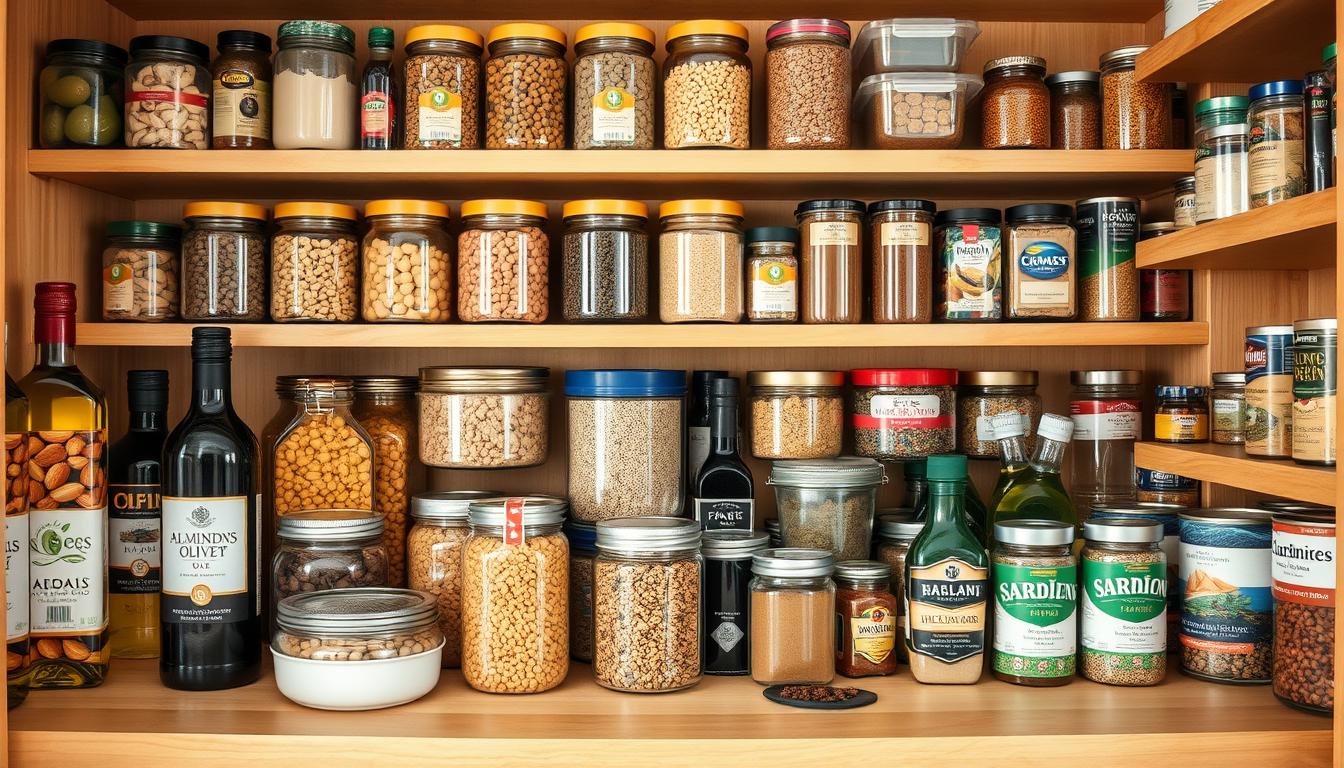
Stock your pantry with these Mediterranean diet essentials for easy meal preparation
Before diving into your meal plan, it’s helpful to understand the basic building blocks of the Mediterranean diet. Setting up your kitchen with the right ingredients will make your transition to this eating style much smoother.
Pantry Staples
Fresh Ingredients to Keep on Hand
Simple Swaps to Make
| Instead of This | Choose This | Benefits |
| Butter or margarine | Extra virgin olive oil | Rich in heart-healthy monounsaturated fats |
| White bread | Whole grain bread | More fiber, nutrients, and slower blood sugar impact |
| Red meat | Fish or poultry | Lower in saturated fat, higher in beneficial omega-3s (fish) |
| Salt for flavoring | Herbs and spices | Adds flavor without sodium, provides antioxidants |
| Sugary desserts | Fresh fruit or Greek yogurt with honey | Natural sweetness with added nutrients and protein |
7-Day Mediterranean Diet Meal Plan for Beginners
This beginner-friendly meal plan introduces you to the Mediterranean diet with simple, delicious recipes that don’t require advanced cooking skills. Feel free to adjust portions based on your personal needs and hunger levels.
Note: This meal plan is flexible! Feel free to swap meals between days, adjust portions to your hunger levels, or substitute ingredients based on what’s available and in season. The goal is to embrace the Mediterranean eating pattern in a way that works for your lifestyle.
Day 1
Breakfast
Greek yogurt topped with honey, berries, and a sprinkle of walnuts
Lunch
Mediterranean tuna salad with white beans, cherry tomatoes, olives, and olive oil dressing on a bed of greens
Dinner
Baked chicken with roasted vegetables (zucchini, bell peppers, onions) drizzled with olive oil and herbs
Day 2
Breakfast
Whole grain toast topped with mashed avocado, a sprinkle of feta cheese, and sliced tomatoes
Lunch
Lentil soup with carrots, celery, onions, and spinach, served with a slice of whole grain bread
Dinner
Grilled or baked salmon with a side of quinoa and steamed broccoli drizzled with lemon and olive oil
Day 3
Breakfast
Oatmeal cooked with cinnamon, topped with sliced apples and a tablespoon of almond butter
Lunch
Greek salad with cucumbers, tomatoes, red onion, feta, olives, and olive oil dressing, served with whole grain pita
Dinner
Vegetable and chickpea stew with tomatoes, spinach, and Mediterranean herbs, served over brown rice
Day 4
Breakfast
Vegetable omelet with spinach, tomatoes, and a small amount of feta cheese, served with a slice of whole grain toast
Lunch
Whole grain wrap filled with hummus, sliced bell peppers, cucumbers, and mixed greens
Dinner
Whole grain pasta with olive oil, garlic, cherry tomatoes, spinach, and white beans, topped with a sprinkle of Parmesan
Day 5
Breakfast
Smoothie made with Greek yogurt, berries, banana, and a tablespoon of almond butter
Lunch
Quinoa bowl with roasted vegetables, chickpeas, a drizzle of tahini sauce, and a sprinkle of pumpkin seeds
Dinner
Grilled or baked white fish with a side of roasted potatoes and a large green salad with olive oil dressing
Day 6
Breakfast
Whole grain toast topped with ricotta cheese, sliced strawberries, and a drizzle of honey
Lunch
Mediterranean-style stuffed bell peppers with quinoa, ground turkey, tomatoes, and herbs
Dinner
Grilled vegetable and halloumi cheese skewers served with a side of tabbouleh salad
Day 7
Breakfast
Whole grain pancakes topped with Greek yogurt and fresh berries
Lunch
Mediterranean mezze plate with hummus, olives, sliced vegetables, whole grain pita, and a small portion of feta cheese
Dinner
Grilled chicken souvlaki with tzatziki sauce, served with a Greek salad and a small portion of whole grain rice
Snack Ideas
Choose 1-2 snacks daily as needed:
5 Easy Mediterranean Recipes for Beginners
1. Simple Greek Salad
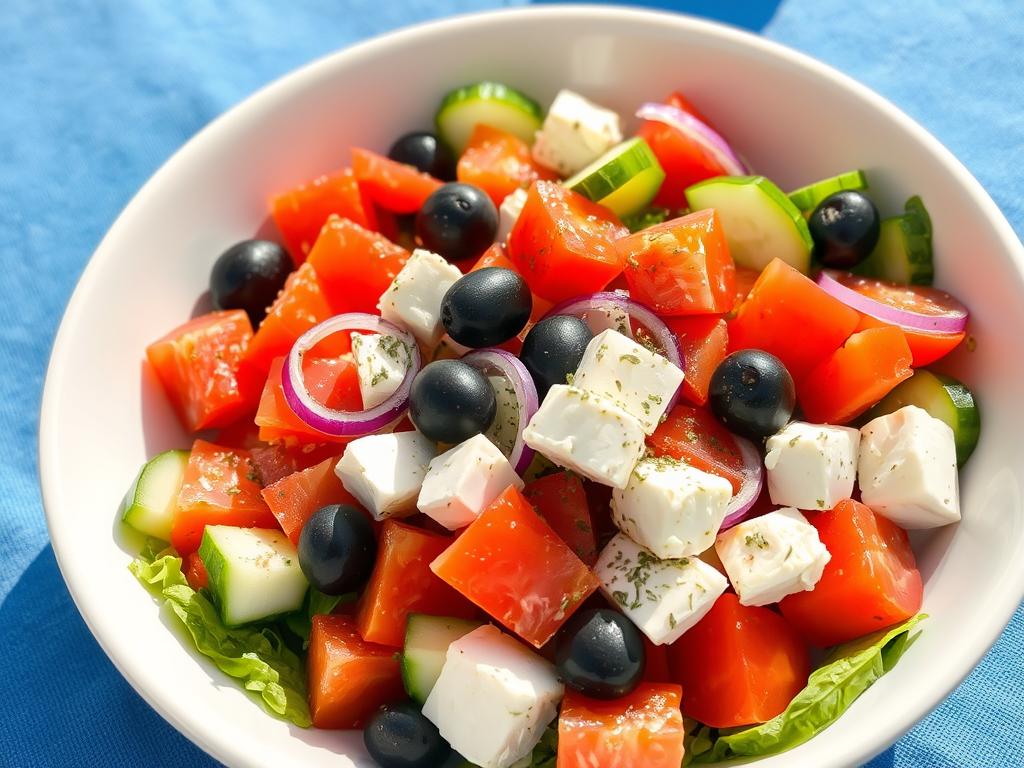
Ingredients:
Instructions:
2. Easy Hummus
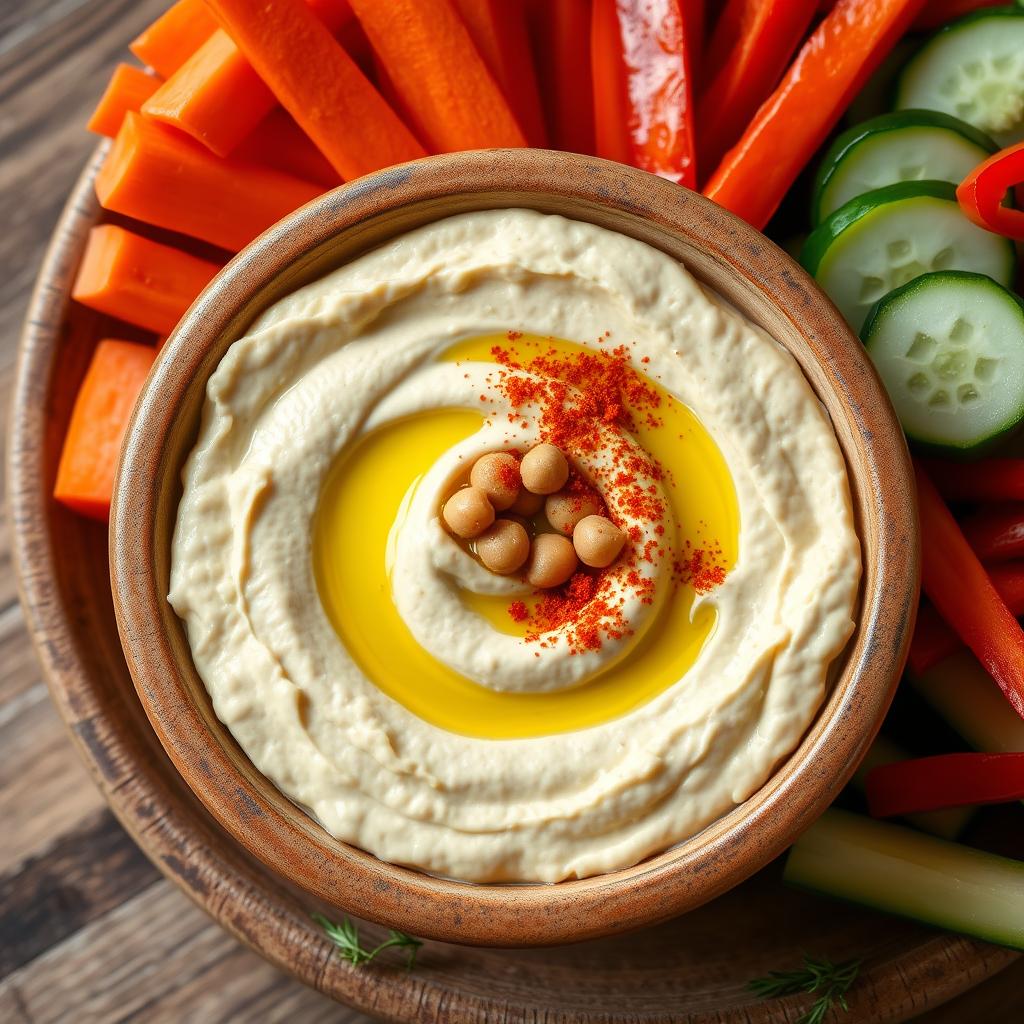
Ingredients:
Instructions:
3. Mediterranean Baked Fish
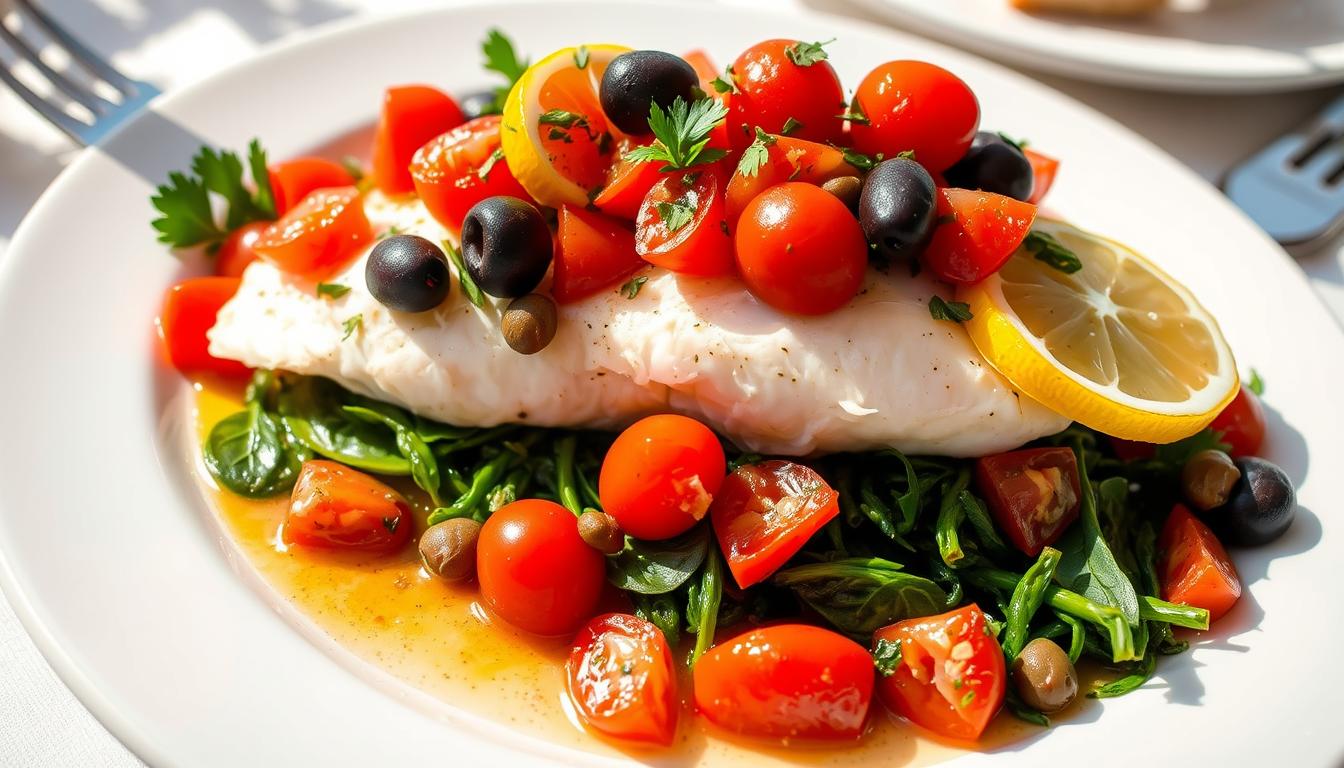
Ingredients:
Instructions:
4. Mediterranean Quinoa Bowl
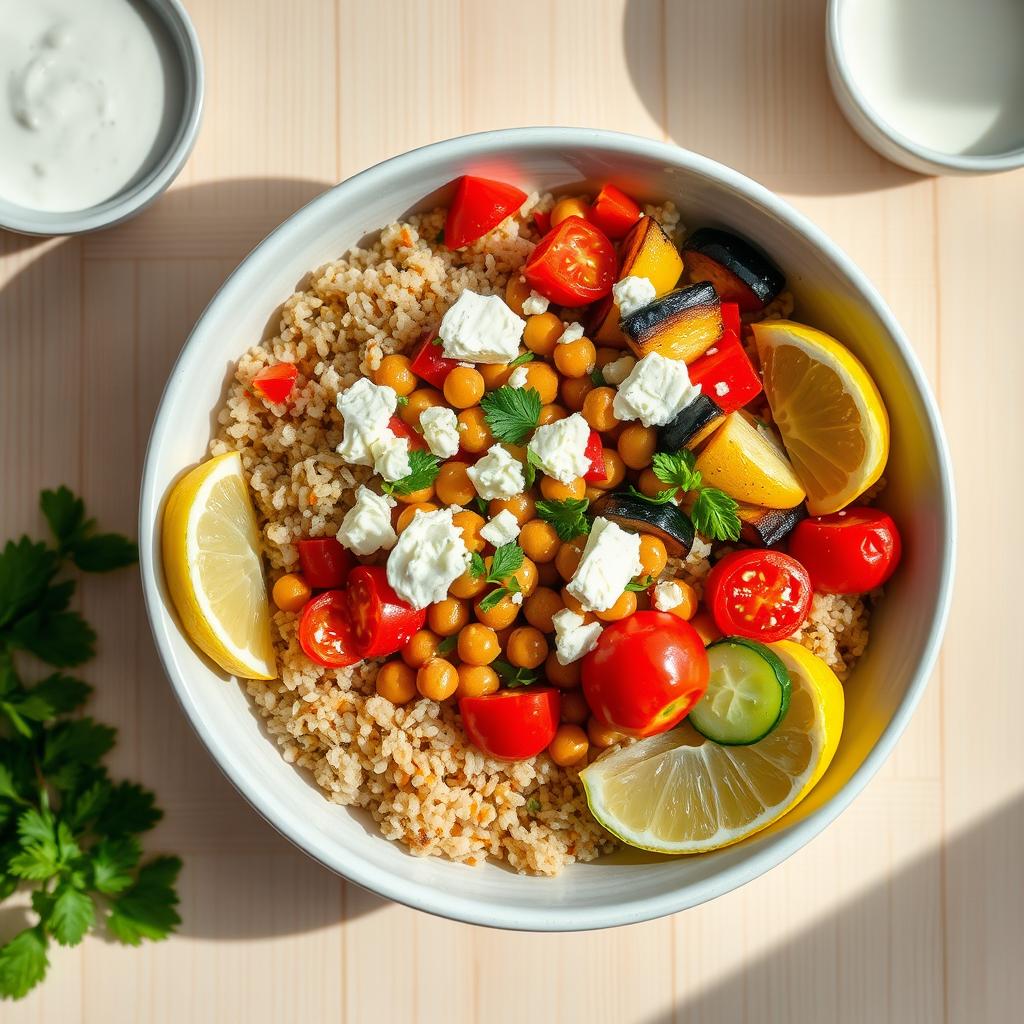
Ingredients:
Instructions:
5. Simple Tzatziki Sauce
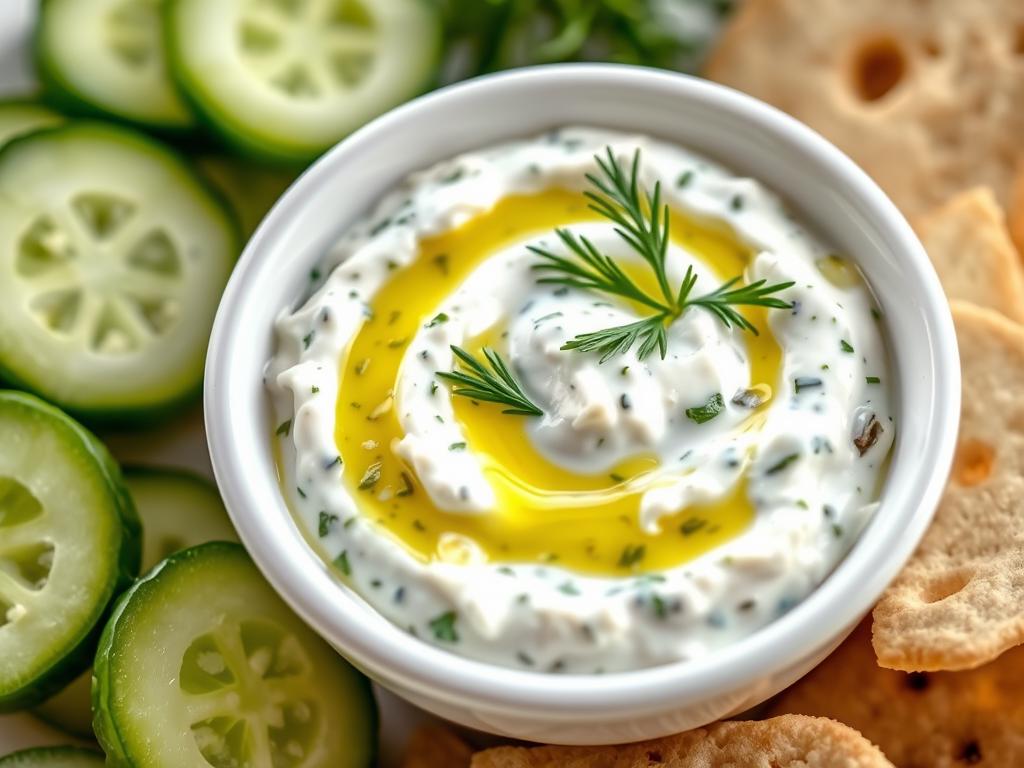
Ingredients:
Instructions:
Tips for Mediterranean Diet Success

Practical Strategies for Beginners
Budget-Friendly Mediterranean Eating
Dining Out on the Mediterranean Diet
How quickly will I see results on the Mediterranean diet?
Many people report feeling more energetic within the first week of following a Mediterranean diet. Physical changes like weight loss typically begin within 2-3 weeks with consistent adherence. However, the most significant health benefits, such as improved heart health markers, may take 3-6 months to become measurable. Remember that the Mediterranean diet is a lifestyle approach focused on long-term health, not a quick fix.
Can I follow the Mediterranean diet if I’m vegetarian or vegan?
Absolutely! The Mediterranean diet is naturally plant-forward, making it easily adaptable for vegetarians and vegans. Simply emphasize plant proteins like legumes, nuts, and seeds, and if you’re vegetarian, include eggs and dairy in moderation. For vegans, ensure adequate B12 intake through fortified foods or supplements, and consider plant-based omega-3 sources like flaxseeds and walnuts to replace the fish component of the traditional diet.
Is the Mediterranean diet good for weight loss?
Yes, the Mediterranean diet can be effective for sustainable weight loss. A 2018 study published in the journal Nutrients found that participants following a Mediterranean diet lost more weight than those on a low-fat diet, even without calorie restriction. The diet’s high fiber content, healthy fats, and protein help control hunger, while its emphasis on whole, unprocessed foods naturally reduces calorie intake. For best results, combine the diet with regular physical activity and mindful eating practices.
Embracing the Mediterranean Lifestyle

The Mediterranean diet is more than just a way of eating—it’s a lifestyle that celebrates good food, physical activity, and social connection. By focusing on whole, minimally processed foods and heart-healthy fats, this eating pattern offers a sustainable approach to improving your health without feeling deprived.
Remember that small, consistent changes are more effective than dramatic overhauls. Start by incorporating one or two Mediterranean principles into your routine, then gradually add more as these become habits. Whether you’re looking to improve your heart health, manage your weight, or simply enjoy more delicious meals, the Mediterranean diet offers a flexible, evidence-based approach that can be tailored to your individual needs and preferences.
The recipes and meal plans in this guide are just a starting point. As you become more comfortable with Mediterranean cooking, don’t be afraid to experiment with new ingredients, flavors, and techniques. The beauty of this eating pattern lies in its diversity and adaptability—there’s always something new to discover and enjoy.
Get well and stay well,
Ray Baker

